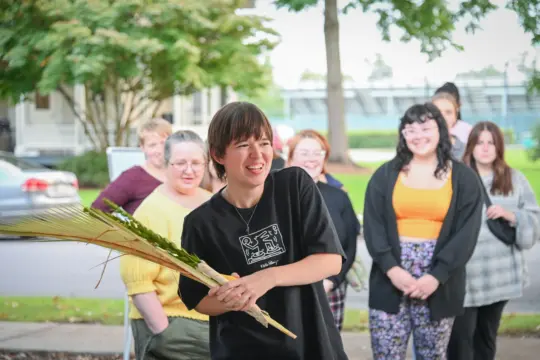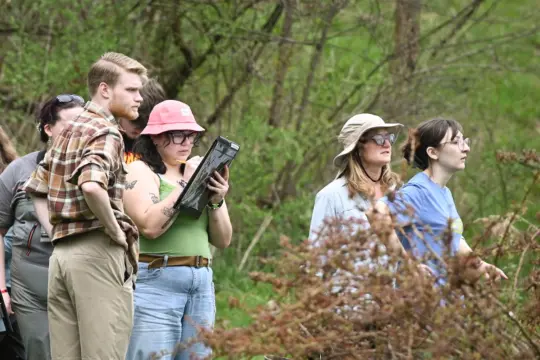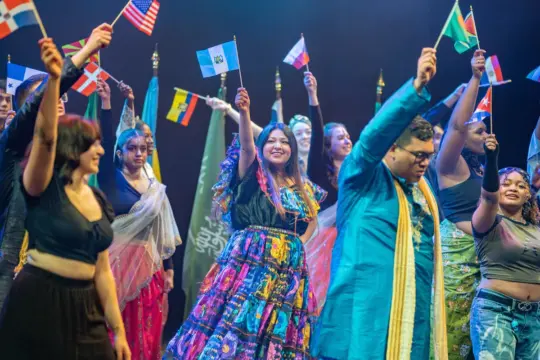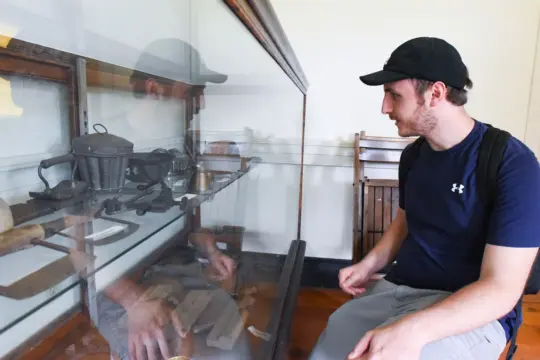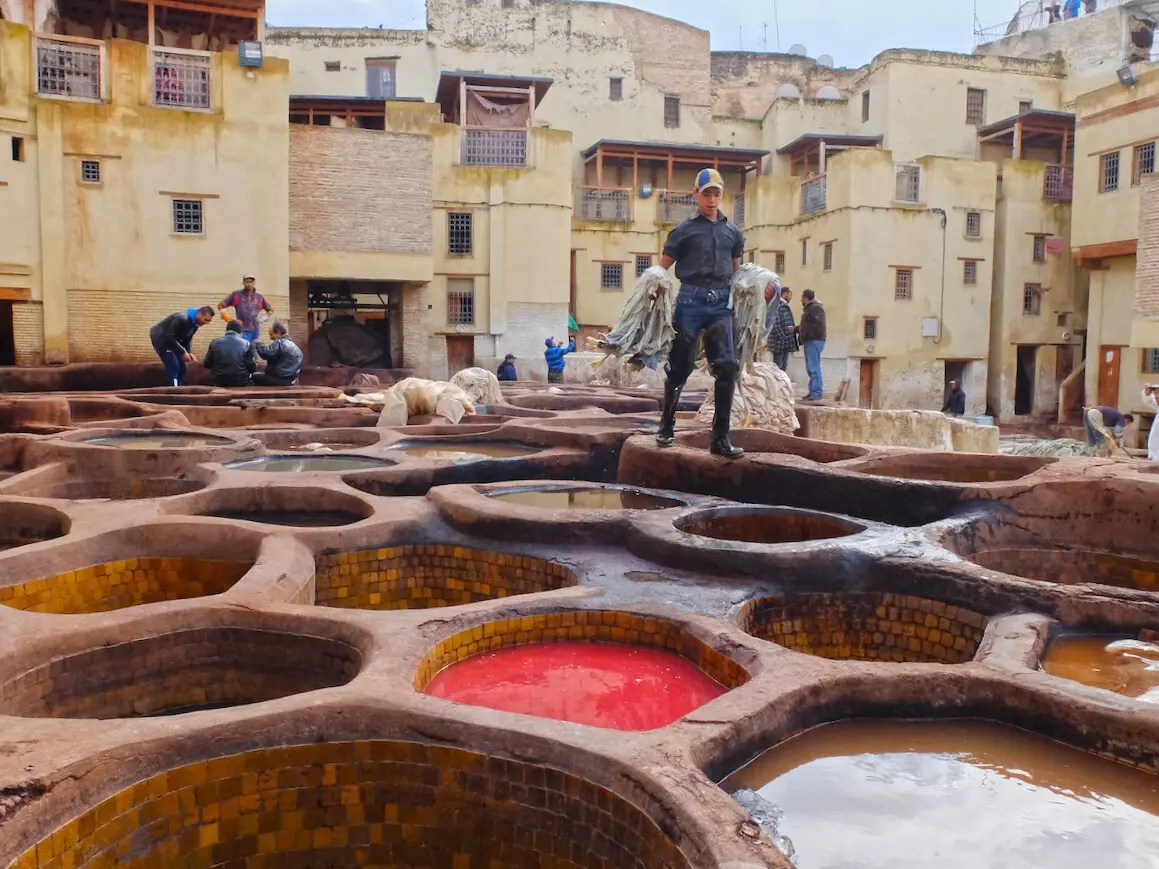
Anthropology Degree
As an anthropologist, you will learn to think critically about all facets of human life.
Big questions will challenge you. What makes humans human? How do we carve out meaningful lives for ourselves in all corners of the world? What role do language and culture play in our evolution and the creative ways we solve problems, make art and connect with others? At Susquehanna University, your curiosity will be fueled by a hands-on, in-depth anthropology education that evokes a greater sense of inquiry and awakens an enhanced spirit of adventure.
You will learn from expert faculty who are active scholars. They will engage you in their research and support your own, independent projects, as you hone your knowledge and competencies to conduct research, communicate in a scientific discipline, problem solve, think critically and work with a team. You will acquire transferable skills, including the ability to communicate cross-culturally, design research studies, conduct surveys and interviews, interpret data, and determine what motivates people, in sites as varied as religious rituals, offices, markets, museums and national parks. In addition to lessons coming to life through engaging research activities, you will benefit from small class sizes as your professor supports your interests, activities and success.
Studying anthropology offers a wide range of career paths in the United States and around the world, from government to business, to high technology and museums. The awesome news is you have the opportunity to go into the field before you even don your mortarboard and robe. At Susquehanna, you can study abroad in several countries through our Global Opportunities (GO) program.
GAIN GLOBALLY RELEVANT AND MARKETABLE SKILLS
Employers say they want creative and analytical thinkers with strong communication skills. Add in the ability to look at issues critically and the tools to do cross-cultural research, and it’s easy to see why sociology and anthropology majors are in high demand.
You’ll explore different cultures and learn how to analyze your own culture in an inclusive environment. And, the career options open to you will be amazing. You’ll be prepared to enter market research, education, museums, international relations, community development, information technology, business or anything else you can imagine. What you do here transfers to any and every career.
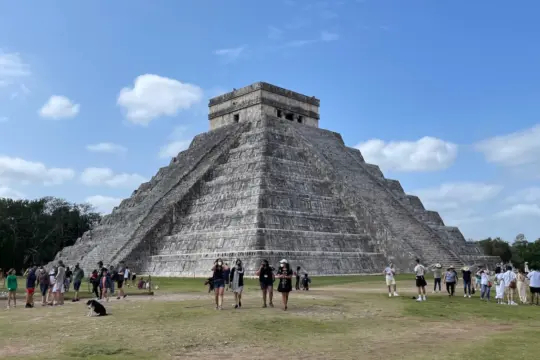
SUSQUEHANNA By the Numbers
More Than Metrics
100%
of students complete capstone projects
95%
of students study abroad
Where Passion Meets Purpose
Straight from the Nest



“The Department of Anthropology and Sociology is smaller than some of the other departments, which means that I have been able to know all the faculty really well. I can just go into their offices and ask them about an assignment or how their day is going. My connection with the faculty here has made learning a lot easier.”
— Sarah Rados ’25
“I served as a curatorial intern at the Lori Degenstein Gallery on Susquehanna’s campus, allowing me to learn how to be a curator of a museum or a gallery. I got to create my own exhibition, which helped me learn about archival purposes, data, cataloging and how to design an exhibit, which is beneficial for my future career as a curator of a gallery.”
— Alayna Wenrich ’25
“Sociology and anthropology students learn to think critically about the world, and to apply careful analysis to social and cultural practices. This is an essential foundation and set of skills for a wide variety of career paths, further studies and engaged citizenship.”
— John Bodinger de Uriarte, Professor of Anthropology
Explore Your Studies
Program Resources
A Glance Into Your Degree Pathway
With support from advisors and course planning tools, your time at Susquehanna is carefully designed to help you succeed. This example provides a glimpse into your degree experience, but you’ll have plenty of opportunities to customize your path with electives or study abroad programs that reflect your passions and career goals.
This course is an anthropological introduction to public culture in the U.S. It takes public culture to be: a public circulation of sensibilities, identities, dreams, styles, discourses, and forms of power; and a way of life enacted and given form in the practices of everyday life and in institutions, laws, social movements, physical and social spaces, and expressive forms. Students will be introduced to key terms and theories in contemporary anthropology and their application in the study of representation; historical imagination; gender, sexuality, and identity politics; and nationalism, citizenship, and globalization. 4 SH. CC: Diversity, Social Interactions, Writing Intensive.
A basic introduction to data analysis, descriptive statistics, probability, Bayes’ Theorem, distributions of random variables and topics in statistical inference. (Students may earn credit for only one of the introductory statistics courses offered by the departments of management, psychology or mathematics.) 4 SH. CC: Analytical Thought.
This course is designed to develop students’ competence as social researchers. We will cover both theoretical issues -like the epistemology and ethics of qualitative research – and practical ones – the nuts and bolts of the research process, from data collection to analysis. The course will focus on the connection between researchers’ theoretical goals and the practical resources and constraints of the research process. Students will be trained in some of the common forms of qualitative social research: ethnography, interviews, content analysis, case studies, and the comparative method. Students will also be required to employ qualitative methods to collect and analyze original data, both for (near weekly) short written assignments and a 15-20 page final research paper. Prerequisites: sophomore standing and at least one introductory course in sociology and anthropology. Same as SOCI-235. 4 SH. CC: Ethics Intensive, Writing Intensive.
This course will explore key interrelationships between museums, anthropology and the practices of representation. Students will be introduced to the history of museums and will also be given the analytical tools to read museums and exhibitions as cultural texts. The course focuses on the production and meanings of public museums and other exhibitionary spaces. We will pay close attention to issues of representation in anthropological and other arenas, to how museums communicate information about cultural-historical processes and events,and to the formation of ethnographic and other subjects. While anthropology and museum studies are the course’s focus, we will not restrict our readings to those disciplines and modes of representation alone but will consider other disciplinary perspectives and offerings. Prerequisite: sophomore standing and ANTH-162 or SOCI-101 or instructor’s permission. 4 SH. CC: Interdisciplinary, Team Intensive.
Considers the nature of belonging in the world today. Who is “at home?” Who is displaced/out of place? Begins with theories of the nation and anthropological research on national communities and nation-building, then turns to a consideration of those considered outsiders to the nation-state, i.e., diasporic, transnational, and refugee communities. Addresses culture as it is formed by the globalization of capital, commodities, media, literacy, and international political and religious movements. Topics covered may include Jewish, Palestinian, African, and Chinese diasporas, refugees in Tanzania and in Europe, and Indian intellectuals in the U.S. Prerequisite: ANTH-162, SOCI-333, or instructor’s permission. 4 SH. CC: Writing Intensive.
This class will build a theoretical base in the anthropology of tourism from which to engage key questions about tourism: How does “tourism” frame our daily experiences? Our collective sense of self and other? ANTH 323 draws on student GO experiences, both completed and anticipated, as well as other domestic and international tourism experiences. The course also depends on students thinking “through” field methodologies — seeing, writing, interpreting and storytelling — as ways to engage tourism and tourist practices. Students are recommended but not required to complete ANTH-162 or SOCI-101. Prerequisite: junior standing. 4 SH. CC:Diversity Intensive, Writing Intensive
Surveys major anthropological theories (e.g., evolutionism, functionalism, structuralism, symbolism, and post-modernism) and theorists (e.g., Malinowski, Radcliffe-Brown, Levi-Strauss, Geertz, and Clifford). Examines how ideas about culture have changed over time. Takes a critical perspective by locating both theories and theorists within national and historical frameworks. Prerequisite: ANTH-162. 4 SH. CC: Historical Perspectives.
A comparative study of family and kinship. Covers the structures and functions of family and kinship in different cultures. Emphasizes historical and contemporary changes in knowledge and practice focused on family, marriage, procreation, and kinship in the United States, with particular emphasis on the cultural construction of kinship, the naturalization of identity and difference, the politics of recognition, and new reproductive technologies. Prerequisite: ANTH-162 or SOCI-101. Same as SOCI-341. 4 SH. CC: Diversity Intensive, Writing Intensive.
Reseach workshop which fulfills the capstone requirement for majors. Prerequisites: ANTH/SOCI-235 or ANTH/SOCI-245 and two courses in anthropology or sociology, at least one of which has been taken at the 300-level or above. SOCI-311 or ANTH-400 recommended. 4 SH. Capstone.
Supervised readings and writings in advanced fields of anthropological study. Prerequisites: ANTH-162, three courses in anthropology, a minimum GPA of 3.0 in departmental courses and instructor’s permission. 1-4 SH. Capstone. May fulfill the capstone requirement with permission of the department head and when taken for at least 2 semester hours. Students not majoring or minoring in sociology or anthropology who wish to use ANTH-501 for their capstone must also have successfully completed ANTH/SOCI-235 or ANTH/SOCI-245, receiving a C- or higher.
Anthropology
Choose from a variety of elective courses within this program to customize your goals.
The discipline of archaeology involves the study of past societies, their practices and behaviors deduced by the analysis and interpretation of their material remains. It is therefore our only access to the three million years of human history before writing. This course is an introduction to method and theory in anthropological archaeology, with consideration of selected case studies. The course begins with an introduction to the history of the discipline and then focuses on archaeological methods and theory to provide a background to the practice of archaeology. Students will learn concepts, methods and techniques required in archaeological excavation and the analysis of material remains. They will have the opportunity to research and discuss problems in anthropological archaeology. The latter half of the course will take the students through a review of some of the major archaeological discoveries of modern times. This will provide a unique opportunity to review past surveys and excavations and to evaluate and critique past efforts in light of current archaeological theory and practice. 4 SH. CC: Social Interactions.
This course is an anthropological introduction to public culture in the U.S. It takes public culture to be: a public circulation of sensibilities, identities, dreams, styles, discourses, and forms of power; and a way of life enacted and given form in the practices of everyday life and in institutions, laws, social movements, physical and social spaces, and expressive forms. Students will be introduced to key terms and theories in contemporary anthropology and their application in the study of representation; historical imagination; gender, sexuality, and identity politics; and nationalism, citizenship, and globalization. 4 SH. CC: Diversity, Social Interactions, Writing Intensive.
This course is an introduction to the field of anthropology. Specifically, the course introduces students to the ways in which anthropologists have thought about and investigated human diversity. We inquire into what it is that makes us human; the unique role culture plays in our humanity; the relationships of culture, language, and biology; and how anthropologists have studied material culture in past and present civilizations using the tools and theoretical paradigms of archaeology. Students explore these questions through the study of ethnographies and a textbook. 4 SH. CC: Diversity, Social Interactions.
ANTH 200 offers a study of selected topics that vary on student and professor interests. This course is well-positioned for multi-disciplinary subjects, including the anthropology of development, multi-species ethnographies, and health and medicine studies, for example. 4 SH.
Examines anthropological concepts of magic, witchcraft, and religion in a cross-cultural context. Drawing on ethnography, anthropological theory, history, and film, the class explores the nature of magic, witchcraft, and religion; the relations among them; and the ways in which they interact with other social formations, for example gender, politics, and economics. Countries studied have included South Africa, India, Haiti, and the U.S. Same as RELI-220. 4 SH. CC: Diversity, Social Interactions.
Exploration of key understandings and discourses about war and the intersection of anthropology and violent conflict. The course begins with an introduction to anthropological theory and methods, then examines the role of anthropology in both understanding and responding to war and violent conflict, and then turns its attention to literature and materials drawn or arising from current wars and violent conflicts in the world. The course focuses on popular and scholarly materials addressing current conflicts, including texts, journal and magazine articles, documentary and ethnographic films, television and popular films, and newspapers. The course seeks to understand how we understand war and what role it plays in cultural practice. Prerequisite: ANTH-162 or SOCI-101 or instructor’s permission. 4 SH. CC: Diversity Intensive, Writing Intensive.
This course is an interdisciplinary introduction to the histories and cultures of the indigenous peoples north of Mexico. Topics to be considered include cultural diversity, colonial history and federal Indian policy, land use patterns, identity and ethnicity, myth and ritual, contemporary issues, representations of Native Americans in the dominant culture, and the role of cultural revitalization and innovation in the negotiation of contemporary community survival. Course readings represent a variety of perspectives, including historical, ethnographic, ecological, and literary. Prerequisite: ANTH-162, ANTH-152, or SOCI-101 or instructor’s permission. 4 SH. CC: Diversity.
This course is designed to develop students’ competence as social researchers. We will cover both theoretical issues -like the epistemology and ethics of qualitative research – and practical ones – the nuts and bolts of the research process, from data collection to analysis. The course will focus on the connection between researchers’ theoretical goals and the practical resources and constraints of the research process. Students will be trained in some of the common forms of qualitative social research: ethnography, interviews, content analysis, case studies, and the comparative method. Students will also be required to employ qualitative methods to collect and analyze original data, both for (near weekly) short written assignments and a 15-20 page final research paper. Prerequisites: sophomore standing and at least one introductory course in sociology and anthropology. Same as SOCI-235. 4 SH. CC: Ethics Intensive, Writing Intensive.
This course will explore key interrelationships between museums, anthropology and the practices of representation. Students will be introduced to the history of museums and will also be given the analytical tools to read museums and exhibitions as cultural texts. The course focuses on the production and meanings of public museums and other exhibitionary spaces. We will pay close attention to issues of representation in anthropological and other arenas, to how museums communicate information about cultural-historical processes and events,and to the formation of ethnographic and other subjects. While anthropology and museum studies are the course’s focus, we will not restrict our readings to those disciplines and modes of representation alone but will consider other disciplinary perspectives and offerings. Prerequisite: sophomore standing and ANTH-162 or SOCI-101 or instructor’s permission. 4 SH. CC: Interdisciplinary, Team Intensive.
This course is intended to introduce students to common methods used in quantitative social science research. It is intended to help us conceptualize a research problem and how to collect evidence to address that research problem. Students will learn how to conduct basic quantitative social science research, evaluate relevant evidence, and determine the best method to be used based on theoretical and practical considerations. The course would also focus attention on such issues such as the time dimension, sampling design and ethical issues when conducting quantitative social research. Finally we use SPSS and series of datasets to test and demonstrate our knowledge of the respective statistical procedures. Upon completion of this course, students should be better able to critically evaluate the quantitative research they encounter in their social science coursework and in the mass media, as well as being able to design a basic quantitative research project. Prerequisite: Sophomore standing. Same as SOCI-245. 4 SH. CC: Ethics Intensive.
Intermediate study of selected topics. Topics vary and depend on student and instructor interest. Possibilities include the anthropology of modernity, cross-cultural perspectives on gender and sexuality, and drugs and culture. Prerequisite: SOCI-101, ANTH-162, or permission of the instructor. 2-4 SH.
Considers the nature of belonging in the world today. Who is “at home?” Who is displaced/out of place? Begins with theories of the nation and anthropological research on national communities and nation-building, then turns to a consideration of those considered outsiders to the nation-state, i.e., diasporic, transnational, and refugee communities. Addresses culture as it is formed by the globalization of capital, commodities, media, literacy, and international political and religious movements. Topics covered may include Jewish, Palestinian, African, and Chinese diasporas, refugees in Tanzania and in Europe, and Indian intellectuals in the U.S. Prerequisite: ANTH-162, SOCI-333, or instructor’s permission. 4 SH. CC: Writing Intensive.
What is the proper relation between the state and its citizens? Should states merely ensure the basic safety of citizens, or should they somehow promote their well-being? How should decisions about what constitutes safety or well-being be made? Through a study of regulation, this course considers how economics, politics, ethics, and aesthics inform life in modern liberal democracies. We begin by establishing a theoretical framework for our study and then turn to four instances in which states seek to intervene in or regulate the lives of citizens, namely the economy, drugs, food, and sex. We will examine issues such as the recent financial meltdown, medical marijunana, food safety, and Internet pornography. Prerequisite: Sophomore standing. 4 SH. CC: Interdisciplinary, and Social Interactions.
Using anthropological approaches to the study of food, this course examines the meanings and uses of various Jewish cuisines as they developed in diverse regions and historical periods. We will consider the laws of kashrut and their modern interpretations, the social history of traditional Jewish foods, the literary development of Jewish cookbooks and literary and cinematic representations of Jewish cuisines and dining. Underlying our study will be questions concerning how class, gender, faith, ethnicity, aesthetics and politics inform Jewish foodways. Because cooking and eating are frequently done in the company of others, much of our work will be collaborative. Same as JWST-312. 4 SH. CC: Diversity, Team Intensive.
Explores key interrelationships between image-making and ethnographic discovery and representation. Students are introduced to the history of ethnographic film and photography, and are also given the analytical tools to read popular films and photographs as cultural texts. The course focuses on the production, representation and use of images to communicate information about cultural-historical processes, events, and subjects. Prerequisite: ANTH-162, SOCI-101, or instructor’s permission. 4 SH.
This class will build a theoretical base in the anthropology of tourism from which to engage key questions about tourism: How does “tourism” frame our daily experiences? Our collective sense of self and other? ANTH 323 draws on student GO experiences, both completed and anticipated, as well as other domestic and international tourism experiences. The course also depends on students thinking “through” field methodologies — seeing, writing, interpreting and storytelling — as ways to engage tourism and tourist practices. Students are recommended but not required to complete ANTH-162 or SOCI-101. Prerequisite: junior standing. 4 SH. CC:Diversity Intensive, Writing Intensive
A comparative study of family and kinship. Covers the structures and functions of family and kinship in different cultures. Emphasizes historical and contemporary changes in knowledge and practice focused on family, marriage, procreation, and kinship in the United States, with particular emphasis on the cultural construction of kinship, the naturalization of identity and difference, the politics of recognition, and new reproductive technologies. Prerequisite: ANTH-162 or SOCI-101. Same as SOCI-341. 4 SH. CC: Diversity Intensive, Writing Intensive.
This course examines religious beliefs, practices, and ways of life that have come to be labled “fundamentalist.” This course attends in particular to their emergence in the modern world and the ways in which they critically engage secular convictions about morality, aesthetics, and epistemology. The focus of the course is on Protestant fundamentalism and the Islamic Revival, but, depending on student interest, the class may also consider ultra-orthodox Judaism or Hindu nationalism. Prerequisite: One of the following: ANTH-162, ANTH-220, SOCI-101, SOCI-102, a 100-level religious studies course, or instructor’s permission. Same as RELI-360. 4 SH. CC: Diversity Intensive, Social Interactions, Writing Intensive.
Surveys major anthropological theories (e.g., evolutionism, functionalism, structuralism, symbolism, and post-modernism) and theorists (e.g., Malinowski, Radcliffe-Brown, Levi-Strauss, Geertz, and Clifford). Examines how ideas about culture have changed over time. Takes a critical perspective by locating both theories and theorists within national and historical frameworks. Prerequisite: ANTH-162. 4 SH. CC: Historical Perspectives.
Focuses on race and ethnic relations in contemporary society and popular understandings of race and ethnicity in the United States. Explores the boundaries and markers for membership in an ethnic, racial, or minority group. Specifically, this course regards race as a social construct that has significance for structural opportunities, experiences, worldviews, and conceptions of self and others. The course investigates the designations “race,” “ethnicity,” and “minorities,” and locates them in foundational and current tensions concerning power and identity. Prerequisite: ANTH-162 or SOCI-101. Same as SOCI-413. 4 SH. CC: Diversity, Social Interactions, Writing Intensive.
Reseach workshop which fulfills the capstone requirement for majors. Prerequisites: ANTH/SOCI-235 or ANTH/SOCI-245 and two courses in anthropology or sociology, at least one of which has been taken at the 300-level or above. SOCI-311 or ANTH-400 recommended. 4 SH. Capstone.
Supervised readings and writings in advanced fields of anthropological study. Prerequisites: ANTH-162, three courses in anthropology, a minimum GPA of 3.0 in departmental courses and instructor’s permission. 1-4 SH. Capstone. May fulfill the capstone requirement with permission of the department head and when taken for at least 2 semester hours. Students not majoring or minoring in sociology or anthropology who wish to use ANTH-501 for their capstone must also have successfully completed ANTH/SOCI-235 or ANTH/SOCI-245, receiving a C- or higher.
Individual work for qualified students with a GPA of 3.0 or higher. Supervised readings and writings in advanced fields of anthropological study.
Individual student work in an appropriate setting. Open only when positions are available. 1-8 SH.
When you enroll at Susquehanna, you’ll be paired with an advisor and application tool to guide you in your course planning and scheduling. The following is an excerpt from the complete course catalog. Enrolled students follow the requirements of the course catalog for the academic year in which they declare each major and/or minor, consult with their advisor(s).
Learning Goals
- Develop a critical understanding of the relationships between individuals, culture and social structures.
- Improve abilities to speak, write and present information clearly to a variety of audiences.
- Develop an understanding of the links between theory and methods in the production of knowledge.
- Analyze and critique the dynamic nature of contemporary social and cultural worlds.
Requirements for Degrees
The Department of Sociology & Anthropology offers a major in sociology, a major in anthropology, a minor in sociology and a minor in anthropology. It also offers, in collaboration with the Department of Education, a course of study that leads to social studies teacher certification.
Students in the Department of Sociology & Anthropology may, with the approval of the advisor and/or department head, complete more than one major and/or minor in the department.
Requirements for a Major in Anthropology
An anthropology major must complete 44 semester hours of coursework primarily in anthropology. Courses in related disciplines (e.g., sociology and history) may be credited toward the major as noted below. Students must receive grades of C- or better in classes applied to the major and achieve a cumulative GPA of 2.00 in the major. Required courses include ANTH-162 Introduction to Anthropology, ANTH/SOCI-235 Qualitative Research Methods, ANTH-400 History of Anthropological Theory and, as a capstone experience, ANTH/SOCI-500 Seminar or, with the permission of the department chair, by taking ANTH/SOCI-501 Independent Research. Of the remaining 28 semester hours, students must take at least five anthropology courses designated as theory courses, one course designated as an area studies course and one elective course. At least 12 of the theory course semester hours must be taken at the 300-level or above. Topics courses or honors courses taught by anthropology faculty may be credited toward the theory requirement pending departmental approval. GO programs reviewed by the department may satisfy the area studies requirement for the major. Depending on the project, ANTH-501 Independent Research may be credited toward either the theory or area studies requirement.
Required Courses
- 4 ANTH-162 Introduction to Anthropology
- 4 ANTH-235 Qualitative Research Methods
- 4 ANTH-400 History of Anthropological Theory
- 4 ANTH-500 Seminar
Theory Courses
- ANTH-110 Introduction to Archeology
- 4 ANTH-152 Public Culture
- 4 ANTH-220 Magic, Witchcraft and Religion
- 4 ANTH-222 Life During Wartime
- 4 ANTH-237 Museums and Anthropology
- 4 ANTH-310 National, Transnational and Diasporic Communities
- 4 ANTH-311 Regulating Bodies: Food, Sex, Drugs and the Economy
- 4 ANTH-312 History and Culture of Jewish Cuisines
- 4 ANTH-322 Visual Anthropology: Imagining the Other
- 4 ANTH/SOCI-341 Family and Kinship
- 4 ANTH-360 Religious Fundamentalisms in the Modern World
- 4 ANTH/SOCI-413 Critical Race Theory
Area Studies Courses
Latin America and the Caribbean
- 4 SOCI-210 Caribbean Culture and Society
- 4 SPAN-447 Seminar in Hispanic-American Studies
- 4 HIST-180 Latin America, 1492-1825
- 4 HIST-181 Revolution and Identity in Latin America
Asia
- 4 HIST-151 Traditional East Asia
- 4 HIST-152 Modern East Asia
Africa
- 4 HIST-171 African Civilization
- 4 HIST-172 Early Modern Africa
North America
- 4 ANTH-227 Native America North of Mexico
- 4 HIST-111 United States History Before 1877
- 4 HIST-112 U.S. History from Frontier to Space
- 4 HIST-115 African American United States History
- 4 HIST-215 The Civil War in the American Experience
- 4 HIST-218 Work and Play in the U.S.A.
- 4 HIST-313 Social History of the United States
- 4 HIST-314 The Long Civil Rights Movement
- 4 HIST-316 Making a Multicultural United States
- 4 HIST-323 History of American Medicine
- 4 HIST-370 American Women
- 4 FILM-230 American Film and Culture
Europe
- 4 HIST-132 Ideas and Guns in Modern Europe
- 4 POLI-226 Soviet and Russian Politics
- 4 HIST-321 European Union
- 4 FRNC-310 French/Francophone Literary and Cultural or Film Studies
- 4 FRNC-460 Seminar on French and Francophone Literature and Culture or Film
- 4 GERM-460 Seminar in German Studies
- 4 SPAN-445 Seminar in Peninsular Spanish Studies
Diasporas and Translations
- 4 JWST-113 Introduction to Judaism
- 4 JWST-115 Jewish Philosophy and Ethics
- 4 JWST-255 Jewish Literature
- 4 JWST-312 History and Culture of Jewish Cuisines
- 4 JWST-338 The Holocaust
Teaching Certification
Secondary Teaching Certification Coursework required by the state of Pennsylvania for admission to the teacher certification program includes successful completion of FYSE-100 or equivalent course (having learning goals related to English composition), at least 3 semester hours in British or American literature, at least 6 semester hours of mathematics coursework (or other courses which satisfy the Central Curriculum Analytical Thought requirement) and at least one 40-hour externship.
Education course requirements for secondary education are:
- EDUC-101 Introduction to Education and Society
- EDUC-250 Educational Psychology
- EDUC-260 Introduction to Special Education
- EDUC-270 Instruction of Exceptional Students
- EDUC-330 Technology in Education
- EDUC-350 English Language Learners: Theory and Instruction
- EDUC-380 Instructional Design
- EDUC-479 Principles of Learning and Teaching in Secondary Education
- EDUC-483 Differentiated Instruction and Classroom Management in Secondary Education
- EDUC-500 Student Teaching package (EDUC-501, EDUC-502, EDUC-503 and EDUC-600)
Sociology students who seek secondary education certification in social studies must take the following additional courses outside the Department of Sociology and Anthropology:
- EDUC-425 Methods of Curriculum Instruction and Assessment in Teaching Social Studies
- ECON-105 Elements of Economics
- POLI-111 American Government and Politics
- POLI-121 Comparative Government and Politics
- PSYC-101 Principles of Psychology
- HIST-322 Pennsylvania History or HIST-324 Pennsylvania’s Pasts and Their Publics
- 1 course in U.S. history (HIST-111, HIST-112 or HIST-115)
Secondary education sociology students must also take the following courses within the Department of Sociology and Anthropology:
- ANTH-162 Introduction to Anthropology
- SOCI-101 Principles of Sociology
- SOCI-235 Qualitative Research Methods
- SOCI-245 Quantitative Research Methods
- SOCI-311 Sociological Theory
- SOCI-333 Development, Globalization and Society or ANTH-310 National, Transnational and Diasporic Communities
- SOCI-341 Family and Kinship
- SOCI-413 Critical Race Theory
- SOCI-500 Seminar or SOCI-501 Independent Research
- 8 semester hours in sociology electives (student teaching may be substituted for the electives requirement)
Honors
The departmental honors program recognizes outstanding academic performance in the major with departmental honors. To graduate with departmental honors in sociology or anthropology, candidates must:
- Have a GPA of 3.50 or above in the major and 3.25 or above overall.
- Secure the recommendation of the department faculty to pursue honors.
- Write a senior thesis or equivalent paper based on departmental seminars.
- Sit for an oral honors examination.
When you enroll at Susquehanna, you’ll be paired with an advisor and application tool to guide you in your course planning and scheduling. The following is an excerpt from the complete course catalog. Enrolled students follow the requirements of the course catalog for the academic year in which they declare each major and/or minor and consult with their advisor(s).
Minor in Anthropology
Students must complete 24 semester hours in anthropology and receive grades of C- or better. All minors must achieve at minimum a cumulative GPA of 2.00 in courses credited toward the minor.
Required courses include:
- ANTH-162 Introduction to Anthropology
- ANTH/SOCI-235 Qualitative Research Methods
- ANTH-400 History of Anthropological Theory
Students must also complete 8 semester hours of anthropology theory courses and 4 semester hours of an area studies course.
- Education
- Market research
- Museums
- Community development
- International affairs
Recent Employers & graduate placements
Beyond Susquehanna
Meet the Faculty
TAKE A VIRTUAL TOUR
Launch Fisher Hall – Academics & Student SupportYOU MAY ALSO BE INTERESTED IN
See the full list of related programs on the School of Natural and Social Sciences page.
Have Questions?
Contact Us
Start your journey.





